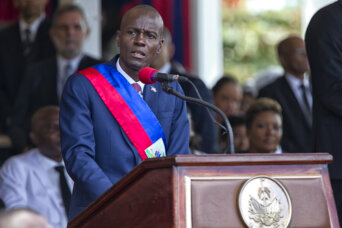- About
- Topics
- Picks
- Audio
- Story
- In-Depth
- Opinion
- News
- Donate
- Signup for our newsletterOur Editors' Best Picks.Send
Read, Debate: Engage.
| topic: | Democracy |
|---|---|
| located: | Haiti, USA |
| editor: | Ellen Nemitz |
Amid the Covid-19 pandemic, thousands of Haitians took to the streets to protest against President Jovenel Moïse, who refused to leave office after his term supposedly ended in February 2021. According to Moïse, the mandate is not over yet.
The five-year term would have been over considering that the previous president left office in 2016, when elections were held. However, a temporary president governed over that year and Moïse only took office in 2017, which is why he claims he is eligible to remain in charge for one more year.
The part of the population that asks for Moïse’s resignation is supported by some national institutions, such as Haiti's Superior Council of Judicial Power. Internationally, the president finds support from leaders such as US president Joe Biden - although the US embassy in Haiti declared that it will scrutinise Haiti’s Constitution and laws' enforcement.
The political crisis has begun much earlier, however. The president drained the parliament one year ago and, since then, he runs the nation by decree, as new legislative elections were not held so far. Furthermore, Moïse has been criticised for forcing the retirement of Supreme Court’s judges and ordering the arrest of alleged coup instigators.
Without an agreement, Judge Joseph Mécène Jean-Louis was requested by the opposition to take office as an interim president - creating a double command situation in a country continuously devastated by climate disasters and economic instabilities that have resulted in a humanitarian crisis.
The Special Representative of the Secretary-General and Head of the United Nations Integrated Office in Haiti, Helen La Lime, pointed out that there is also an ongoing attack on freedom of expression in the country, which is manifested in threats and attacks on journalists, lawyers, judges and human rights defenders. She also expressed concern over the "resurgence in kidnappings as well as the persistent impunity and lack of accountability for serious crimes in Haiti."
According to the analysis of sociologist and journalist Lautaro Rivara, the story may be read from a different angle. In an article titled Siete tesis equivocadas sobre la situación en Haití (Seven Wrong Thesis on Haiti’s Situation) - the author recounts the exploitation and colonisation history of the country, which dates back centuries, but is also recent: the US, France and Canada are dubbed by him the ‘triad of recolonisation’.
"But over the last 50 years there have been mediation and prominence from multilateral agencies, such as the Organization of American States (OAS), the United Nations and interest groups such as the Core Group - formed by self-declared ‘friends of Haiti’ countries, most europeans, with mining, migration, finance or geopolitical interests in the country," affirms Rivara.
The sociologist also discusses whether there were a coup attempt against Moïse or not, and if Haiti needs international intervention to solve its problems. His words do not favour any social or political actors, and seek for a complete analysis of the scenario.
Over any opinion or power dispute, however, democracy must prevail. Only through transparent elections should the people of Haiti achieve their rights for life dignity, health, education and other basic human rights.
Image: MINUSTAH PHOTO.

